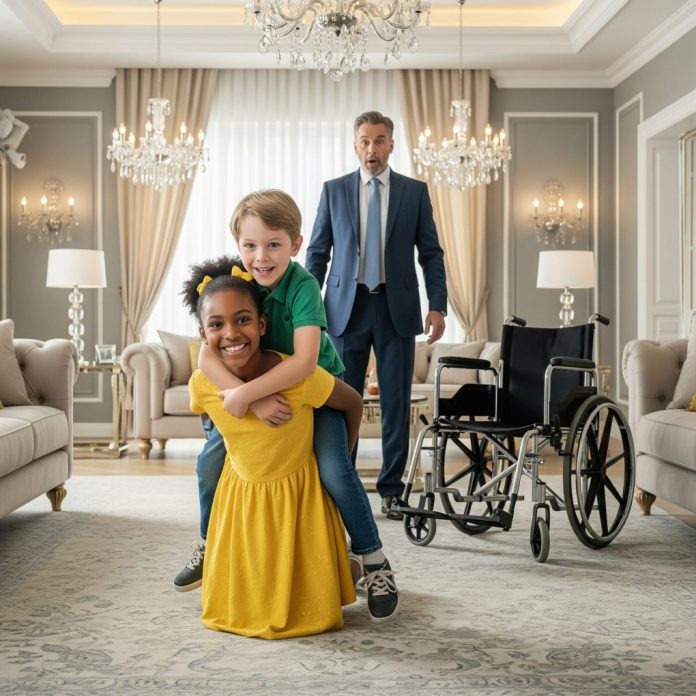Marcus Blackwood arrived at his Connecticut mansion unexpectedly, several hours ahead of schedule. Without notifying his assistant, household staff, or his twelve-year-old son Tommy, he intended to uncover what took place within his home when nobody anticipated his visit. In recent weeks, Marcus had sensed an unusual atmosphere: quiet whispers among the servants, an unfamiliar energy, and most concerning, a growing distance from his son.
Since the tragic car accident that claimed his wife’s life two years ago, Tommy had been confined to a wheelchair. Despite Marcus providing every possible aid—specialized doctors, private tutors, therapies, and advanced medical equipment—the boy’s spirit seemed to fade progressively.
With cautious silence, Marcus used his golden key to enter the house. The stillness was almost overwhelming. The echo of his polished shoes against the marble floor heightened his growing suspicion. Suddenly, laughter broke through the quietness—a genuine, heartfelt laugh, unlike any polite or forced sounds Tommy had produced around his caregivers.
Drawn by the joyful noise, Marcus moved towards the living room. What he saw made him stop abruptly.
On the plush carpet, a girl about Tommy’s age wore a creased yellow dress and crawled on all fours, her long hair swaying with each movement. Tommy was perched atop her back, laughing freely with flushed cheeks. His wheelchair lay untouched in a corner.
“Faster, Luna, faster!” Tommy giggled, gripping her shoulders tightly.
A mix of emotions flooded Marcus — shock, anger, and embarrassment. His son was playfully riding the maid’s daughter like a toy, and in that moment, he seemed more alive than Marcus had witnessed in years.
“What is the meaning of this behavior?” his voice boomed across the room.
The children froze in place. Luna gently helped Tommy down, her eyes filled with apprehension. “We were just playing, sir,” she murmured.
Marcus’s response was laced with bitterness. “This is not a play area. You are the daughter of a servant; you do not belong here.”
Tommy’s grin faded swiftly. “But Daddy—”
Marcus cut him off sharply, “Silence! You will not be allowed to associate with my son again.”
However, something unexpected unfolded. Despite his frailty, Tommy steadied himself using the couch. With trembling limbs, he stood and shouted, “Stop it, Daddy! Don’t be cruel to her! She is my friend!”
“She’s the only one who doesn’t treat me like I’m broken!” Tommy exclaimed, his voice trembling but resolute.
Marcus stared, disbelief overwhelming him. This was not the fragile child he imagined protecting, but a boy demanding recognition.
Stepping forward, Luna, though shaky, spoke gently, “Please don’t raise your voice at him. This was my idea; I just wished to see him smile again.”
Marcus retorted sharply, “You think you understand what’s best for my son? You are merely a maid’s child—do not presume anything.”
Interrupting him, Tommy said, “You don’t understand, Daddy! I’m tired of being treated like I’m fragile. All the doctors, tutors, and everyone telling me I won’t ever be normal—Luna makes me forget all that. With her, I feel like myself again!”
Marcus staggered, struck by his son’s honesty. A child not broken, but yearning to be truly seen.

As tension filled the room, Luna’s mother, Maria, entered hurriedly, her apron dusted with flour. Upon witnessing the scene — her daughter holding Tommy’s hand while Marcus loomed over them — she paled.
“Please forgive her, sir. She won’t disturb Master Tommy again,” Maria pleaded.
Tommy, voice breaking with emotion, declared, “No! If Luna must leave, then I will leave too. I don’t care about this house or the fortune. I only want a friend.”
The weight of those words deeply affected Marcus. His son would rather forsake their luxurious home than lose such a simple companionship. Encouraged by Tommy’s resolve, Luna said while tears welled, “Mr. Blackwood, he isn’t broken. He only needs someone to believe in him. I believe in him.”
Silence enveloped the room. Marcus felt powerless for the first time in years. Recalling his late wife Sarah, who always knew how to bring happiness to Tommy, he now recognized a remarkable truth: a servant’s daughter was achieving what wealth and control could not—restoring his son’s laughter.
Despite the pride urging him to reject her, his heart prompted otherwise.
Sinking into a leather chair, Marcus was overwhelmed by the realization of his son’s loneliness—isolated in a grand estate surrounded by staff, yet lacking anyone who genuinely understood him.
- Marcus acknowledged all the material comforts he had provided.
- Yet, he admitted to the absence of true companionship for Tommy.
- Luna’s presence revealed the importance of emotional connection over possessions.
“Tommy,” Marcus said softly, “you have access to the finest tutors, doctors, and amenities…”
“But not a true friend,” Tommy interrupted, tears carving trails down his cheeks. “Luna sees me, not my wheelchair. When was the last time you saw me that way?”
Struggling to recall, Marcus realized his focus had shifted from his son to his limitations.
Luna, wiping her tears, whispered, “Mr. Blackwood, your son is courageous and kind. He shares stories with me, assists me with reading, and brings laughter. Isn’t that what counts?”
Maria attempted gently to fetch her daughter, but Marcus raised a hand, requesting silence. For the very first time, he regarded Luna not as a housemaid’s child but as the young girl restoring happiness to his son.
“You have given Tommy something I had forgotten how to offer,” Marcus confessed quietly. “You have returned his joy.”
Cautiously hopeful, Tommy asked, “Does that mean Luna can stay?”
Suppressing his pride, Marcus nodded. “Yes, but there is one condition.”
Nervously, the children awaited his words.
“The condition is that sometimes, I join you. I may have forgotten how to play, and maybe you both can teach me.”
For the first time in many years, Marcus laughed—a genuine and carefree sound. Tommy embraced him tightly, “Really, Daddy? You will play with us?”
“Indeed,” Marcus replied, holding him close. “I no longer want to just protect you; I want to live with you and rediscover the world through your eyes.”
The setting sun filled the spacious living room with a gentle golden glow. In that moment, Marcus felt a transformation—not just as a businessman or grieving father but truly as a father once more.
Watching his son laugh alongside his dear friend, Marcus grasped that wealth meant nothing without this precious gift: love, laughter, and the bravery to set a child free.
Conclusion: This poignant encounter illustrates how genuine human connection can heal wounds that money and control cannot. By embracing friendship and understanding, Marcus began to rediscover the joys of fatherhood and the true meaning of happiness within his family.
